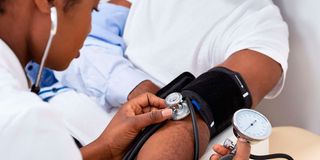Millions of Kenyans have abnormal blood pressure

A medic takes a blood pressure test.
More and more Kenyans are living with elevated blood pressure levels, recent screening tests done by the Ministry of Health show.
More than 3.3 million people registered abnormally high levels of blood pressure readings while more than 806,000 cases of hypertension were confirmed, raising concerns over the burden of cardiovascular diseases (CVDs) in the country.
Hypertension, commonly referred to as high blood pressure, is a major risk factor for stroke.
So far, more than 17.4 million blood pressure tests have been done by the ministry in collaboration with Kenya Cardiac Society and Healthy Heart Africa, a programme of World Heart Federation (WHF) and AstraZeneca. The latest findings have highlighted the need to reinforce the country’s health system in addressing CVDs.
According to the World Health Organisation (WHO), approximately 15 million people globally suffer from stroke each year while about 5.8 million deaths are attributed to it.
Health experts are now calling for sustainable solutions to control hypertension mainly to manage stroke and also address other health complications.
The CVDs and non-communicable diseases (NCDs) burden in Kenya cannot be overemphasised, with 25 per cent hospital admissions and 13 per cent deaths linked to heart diseases such as stroke.
During a roundtable session dubbed ‘building effective and sustainable health systems for hypertension and CVD care in Kenya, public and private sector stakeholders raised concerns over the existing gaps in addressing CVDs and NCDs.
While acknowledging that the ministry of Health has made great strides in bridging gaps in CVD detection, management, and control through strengthening health systems initiatives, the medics noted that there is still need for collaborative action.
During this year’s World Stroke Day held last month, the focus was on ‘the importance of knowing the signs of stroke and the power of saving #PreciousTime.’
A stroke occurs when blood supply to a part of the brain is interrupted either by a clot or by bleeding causing surrounding brain tissue to die.
Damage to the brain means that stroke survivors may be left with disabilities and impairments that affect how they move, speak, think, and feel.



